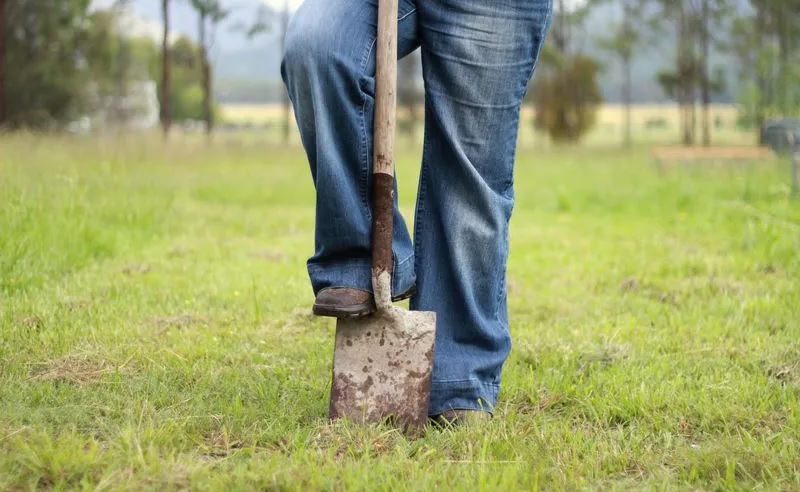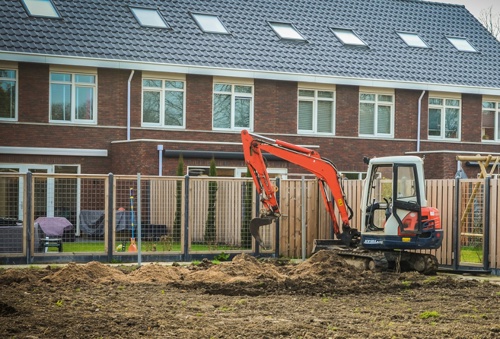Digging in the ground is not allowed just like that. There are rules to digging in the ground. These rules come from laws such as the WIBON (formerly WION) and directive careful digging. These laws and guidelines apply to everyone who is going to dig. So both private individuals or companies in the Netherlands.
Are you going to dig with a shovel or by hand and not deeper than 40 centimeters? Then you may start working immediately and do not need to ask permission. However, it is advised to consult cable and pipeline information. This will also prevent you from possibly hitting a fiber optic cable or power line that may be shallow.

If you are going to use an excavator (or any other form of machine digging) you are always required to file a Klic request. For example, to realize a swimming pool in the garden, will an excavator be used? Then there are a number of rules you need to take into account. This has to do with the term: machine digging.
In this blog we will go deeper into digging in the ground and machine digging and the laws that apply to it. So that you are well prepared and can get started without problems when you start machine digging in the ground.
When you have big plans for the garden and anIntroduction excavator is needed, you need to know one thing: you are not allowed to just start digging in the ground. This is to prevent damage to cables and pipes. Read more about working near cables and pipes in the knowledge article.
You have to report this and file an excavation report. An excavation notification is also known as a Klic request (excavation notification or klic request land register).
A Klic request is described in the Information Exchange on Overground and Underground Networks and Networks Act. Formerly also referred to as the 'groundworkers regulation' and 'the Underground Networks Information Exchange Act' (or: WION).
Without making it too legal, concerning Klic request are the following legally required provisions. Article 2 of the WIBON describes the general duty of care:
Paragraph 2: "The excavator performs the excavation work in a careful manner." So you are obliged to dig carefully.
Paragraph 3: specifies what the ground worker must do in any case (at least) to fulfill his duty of care: "In implementation of the second paragraph, the ground worker shall at least ensure that:
a. prior to commencement of the excavation work an excavation notification has been made,
b. an investigation has been conducted into the precise location of parts of networks at the excavation site,
c. the area information received from the Service is digitally present at the excavation site."
Applying for Klic request
In short, according to the WIBON, you are required to apply for a Klic request for excavation. You must do this before you start machine digging in the ground.
So when you get started, you must file a Kadaster Klic notification. This is regardless of how deep you dig. A Klic request is done for the safety of yourself or the person who is going to dig. But also to prevent damage to cable networks.
You can submit a Klic report at least 20 working days before you start digging. This way the cable and pipeline information is always up to date. You must make the notification at least 3 working days before the start of the excavation work. Read more about the application for such a Klic request here.
After you have submitted your Klic request, it will be valid for 20 working days. According to the WIBON, you must then start the excavation work within these 20 working days. So that the cable and pipeline information is up to date.
Klics an abbreviation for 'Kabels en Leidingen Informatie Centrum'. Read more about the meaning of a Klic request in our knowledge article.
Now you may be thinking: 'I'm going to dig in my own garden, then that's allowed, right?' A Klic request on your own property is also required to start machine digging in the ground. Even though it is your own garden. This is mandatory under the WIBON Act. The government has determined that you never know exactly what is under the ground. It is better to be well prepared than to suffer damage because you do not know what is where.
In short, wherever and whenever you use an excavator: a Klic report is mandatory.
Digging in the garden: 3 tips to do it safely and according to the rules
Digging in the garden (less than 40 centimeters) without an excavator? Then you still need to be careful. A cable might turn up somewhere. Think of fiber optic cables that are sometimes only a few centimeters deep.
Proceed calmly and dig layer by layer. That way you won't have any unwanted surprises;
Be especially careful when digging near the front door or around the front of the house. This is where you are most likely to encounter pipes and cables;
Fiber optic cables are very fragile and susceptible to damage if a lot of force is applied to the shovel. So take this into account.
Despite the fact that you will be digging manually, it is better to be on the safe side. For example, do you still doubt that you are digging too deep? And would you like to know where the cables and pipes are underground? Then, just to be on the safe side, make a Klic report.
Request it quickly and easily at www.klic-app.nl and enjoy the benefits. For more information about laws, regulations, cables, pipes or the digging chain: go to ikgagraven.nl.

Klic App does not act for or on behalf of the Land Registry.